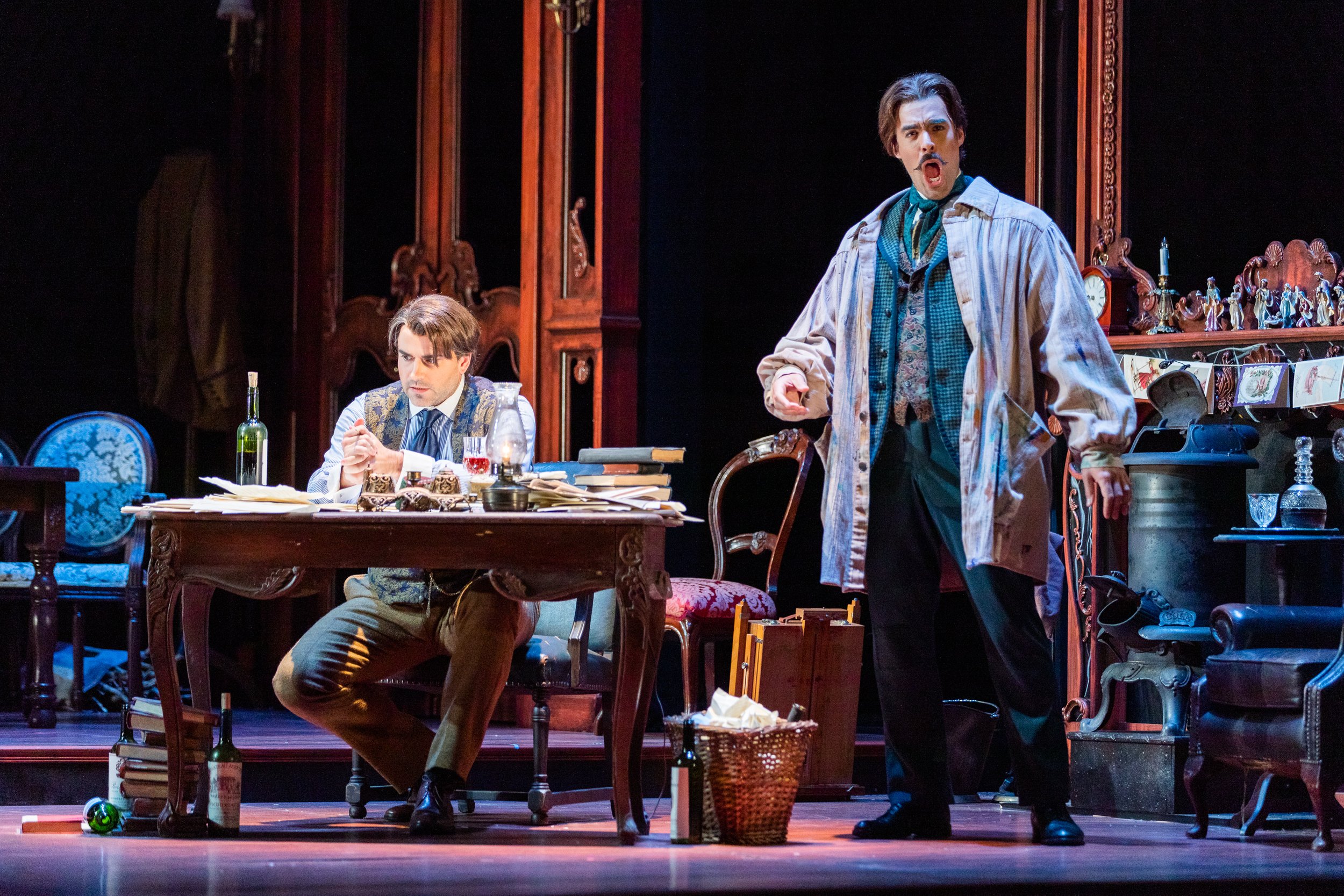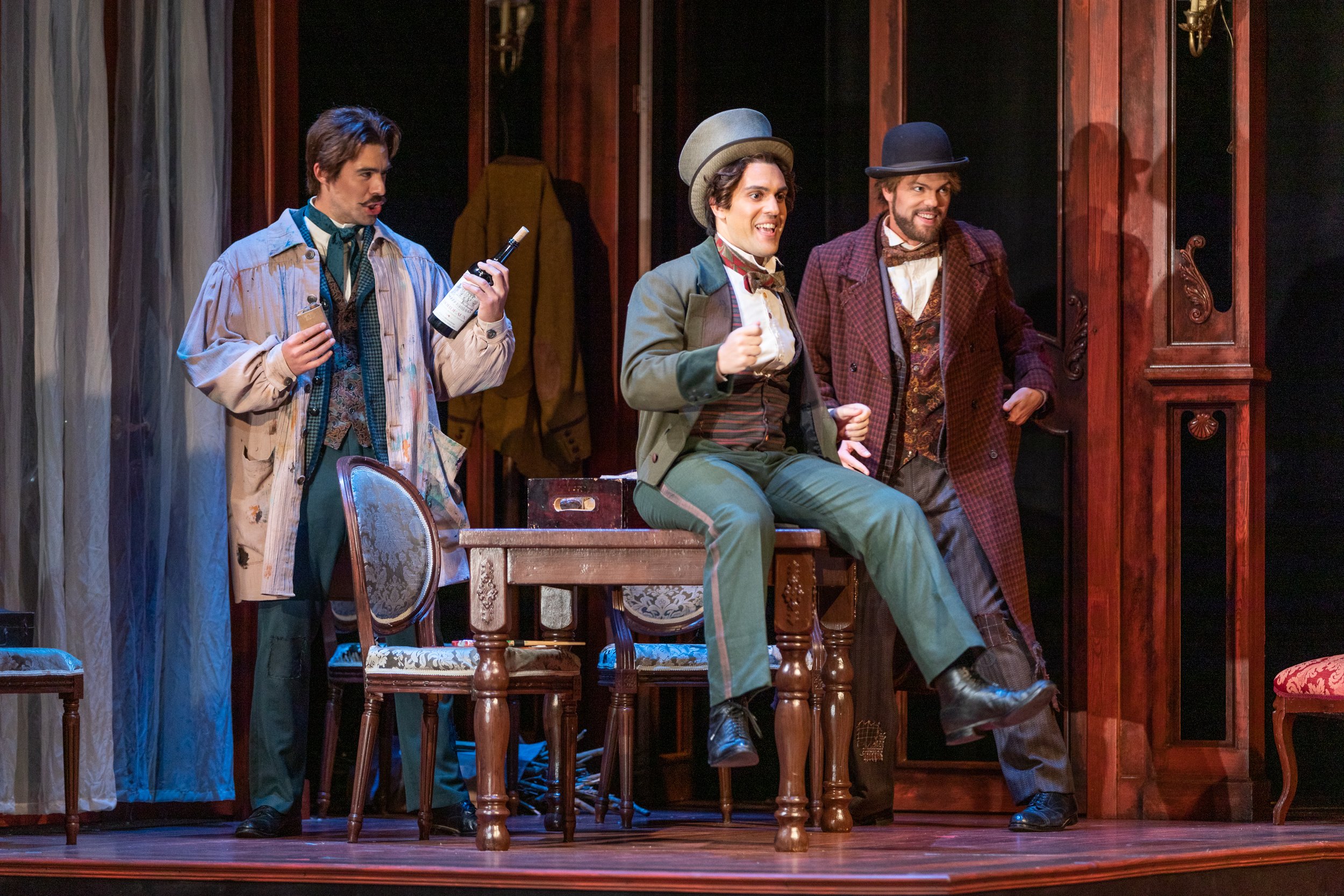This COVID-friendly adaptation of La Bohéme is admirably done by a company that has worked as hard as any to serve its fans and recruit new ones during a pandemic that has both prevented performances altogether and constrained whatever was possible - for over a year and a half to the present day. Fans in attendance so far not only got to hear Puccini’s beautiful music and some great (I really mean great) singing, they also got to view the same story from a different and engaging new perspective as ‘Rodolfo remembers’. This version is worthy of additional viewings to absorb all its nuances. This is high art and high entertainment that touches even the coldest of hearts.
Virginia Opera has had to endure multiple COVID restrictions, including mask wearing, social distancing, ensuring vaccinations for staff and performers, twice weekly testing for those in rehearsals, as well as restrictions placed on venues, and had to make plans for their productions months ago before the current pandemic situation could be assessed, with outbreaks of the delta variant popping up across the country, and these measures worked; not one VO performer has tested positive. In September, the company presented Richard Wagner’s Das Rhinegold, both shortened and presented in an open-air venue (Topgolf) as pandemic compromises. Most companies in the mid-Atlantic are presenting no fully-staged operas this Fall, or at most one. Fortunately, VA Opera’s Artistic Director and Principal Conductor Adam Turner had worked with San Diego Opera and was familiar with their new, COVID-friendly adaptation of La Bohéme, which, by the way, was presented as a drive-in opera with attendees in their cars! What’s old becomes new again, in more ways than one. Fortunately, the singers for this production can sing without masks now and even touch each other and we can hear the music and singing without speakers.
Soprano Raquel González as Mimi and tenor Matthew Vickers as Rodolfo remembering their first meeting and the lost key on the floor. Photo by Ben Schill Photography; courtesy of Virginia Opera.
This new adaptation, co-authored by Keturah Strickann and Bruce Stasyna for San Diego Opera, tells the story as the process of Rodolfo remembering the love of his life Mimi and his bohemian friends in 1840s Paris, as he comes to terms with his grief over her death; Ms. Strickann, who has a history with VO, also reprises her role as stage director of the original production. It’s ten years later and we see Rodolfo’s memories acted out on stage: the camaraderie of his fellow bohemians in their youthful exploits, Marcello the painter, Colline the philosopher, and Schaunard the musician, Rodolfo’s first encounter with Mimi, the dinner at Café Momos punctuated by the riff and reunion of Marcello with Musetta, a woman who lives by her wits, the estrangement of Mimi and Rodolfo, and their deathbed reunion as Mimi is lost forever. We get all this and the advantages of in door theater staging. What do we miss in this telling? We lose the comedic encounter with the landlord Benoît as scene shortening, the street scene (COVID), and the children’s and adult choruses (COVID). All the big arias are retained with the heart of the story.
left: Rodolfo (Matthew Vickers) remembering a cold night with Marcello (baritone Luis Orozco) when he burned pages from a manuscript to add some heat to the room. right: A memory of his friends, Marcello (Luis Orozco) checking out the wine, Schaunard (baritone Nicholas Martorano) on the table, and Colline (bass-baritone Eric J. McConnell) standing. Photos by Ben Schill Photography; courtesy of Virginia Opera.
When it was over, the music had been played so beautifully, I was ready to shower Artistic Director and Conductor Adam Turner with praise, but the fellow who came on stage to bow and receive applause didn’t look like him; I had missed the notice in the program. So instead, let me shower my praise on Assistant Conductor and Chorus Master Brandon Eldredge who was in the pit for the Fairfax performances and to the excellent Virginia Symphony Orchestra. Mr. Turner participated in the pre-opera discussion and I asked him if COVID restrictions had affected the orchestra for this production. He indicated that there was a full string section, but the brass and woodwind sections had been slightly reduced (those players cannot wear masks in rehearsals). He predicted I would not be able to tell the difference and he was correct. While a couple of times I found the music slightly overriding the sound from the singers, this was La Bohéme music performed as beautifully as I have heard.
A memory of the evening’s dinner at Cafe Momos with friends, Colline (Eric J. McConnell), Schaunard (Nicholas Martorano), Mimi (Raquel González), Rodolfo (Matthew Vickers), and Marcello (Luis Orozco). Photo by Ben Schill Photography; courtesy of Virginia Opera.
Now here is where Virginia Opera’s production of this classic truly excels, the singing! Tenor Matthew Vickers gives the performance of his life as Rodolfo; his burnished metallic tenor sounded the best I have heard him, hitting all the high notes. He was equally matched in dulcet tone, by newcomer to Virginia Opera, soprano Raquel González, whose gentle, calm manner maintained an edge of pathos that was perfect for Mimi. Their duets were both thrilling in sound and emotionally affecting; it was easy to believe this couple was in love. The wild card in Bohéme for me is always the soprano who sings the role of Musetta, who has an aria “Quando me'n vo” sung at Café Momos that is a showpiece, and the acting for this complex role requires a much greater range than for Mimi. In her debut with VO, soprano Marlen Nahhas managed the role delightfully and sang a lovely “Quando”; I have seen Ms. Nahhas perform with Washington National Opera’s Cafritz Young Artists; she is a budding star. Rodolfo’s friends sung by baritone Luis Orozco as Marcello, bass-baritone Eric J. McConnell as Colline, and baritone Nicholas Martorano as Schaunard sung their roles well and demonstrated the bohemian camaraderie so important to projecting the charm and warmth of youthful friendships in La Bohéme. Ricardo L. Lugo served admirably as Musetta’s wealthy admirer, Alcindoro.
A memory of Musetta (soprano Marlen Nahhas) using her wealthy admirer Alcindoro (Ricardo L. Lugo) to incite Marcello’s jealousy. Photo by Ben Schill Photography; courtesy of Virginia Opera.
The set for Rodolfo Remembers is impressive, an upscale room for the now successful writer, Rodolfo with two draped, floor-length windows, a desk and table, and a chaise sitting area. The friends come and go as Rodolfo remembers them, then Mimi appears entering through the window, bathed in light that makes her appear almost an apparition. All of the memories take place in this room as Rodolfo imagines them. Kudos to set designer Court Watson and lighting designer Mary Shabatura! Also kudos to Court Watson for great looking costumes that enhanced the eye appeal of the staging. Director Strickann does a good job at playing the scenes out and moving the singers around as scenes change without a break, only moving a few props around with some pretend movements in imperfect memory fashion, as Roldofo remembers the crucial elements but not all the details. In the end, it’s not the details that matter but what is revealed about the human heart. Ms. Strickann succeeds on that count and kudos to her.
My mind kept playing tricks on me as I watched the performance; my memories of other versions of La Bohéme I had seen caused me to keep placing Rodolfo in the action, when in this version he really is just an observer of his memories. I’d like to see it again to sort more of that out. Seeing it again also would be very easy on the eyes and ears and good for my soul. As the applause died down at the end, my wife turned to me and said, “This felt like being at the opera!”. Indeed, it did, and it was, no longer just a memory, after a very long time.
The Fan Experience: After three performances in Norfolk and two in Fairfax, Virginia Opera will perform La Bohéme: Rodolfo remembers in Richmond on Friday, November 19 and Sunday, November 21. Tickets remain available, priced $20 to $130 - don’t be afraid of the cheap seats; sometimes the sound is best in those, though the view is better in the pricier ones. Sung in Italian with English surtitles, 90 minutes with no intermission. Currently, all Virginia Opera indoor venues require proof of vaccination for attendance, with mask wearing inside the venues.
A new VO feature this season is an hour-long pre-performance Zoom discussion with Joshua Borths, Professor of Music History at Capital University, discussing each upcoming opera and its background, this time including participation by Director Stickann; it’s well worth viewing live before or as a video after you go. These are available on Facebook and YouTube under the title “Let’s Talk Opera with Josh Borths”. There is also a half hour pre-opera talk an hour before the opera that I recommend to increase your appreciation for what you are about to see and answer you questions.
My schedule won’t allow me to attend another performance, but i’d love to see a video of Rodolfo Remembers. To Virginia Opera: Hint, hint.





